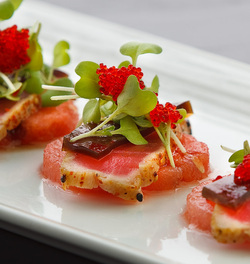 The most important often-overlooked point about the food we eat is not the flavour or substance but the presentation and preparation. When eating a holiday meal or dining out we expect perfect flavour and presentation but how often do we consider it in our daily meals? While I admit I am not a chef, I want to briefly write about the importance not just eating healthy foods but of the presentation and process in which we create the food we eat. Our society is obsessed with convenience and one of the casualties is food. We are all familiar with fast food being poor in nutrients, vitamins and fibre but we also lose out on the important process of making and creating our own meals when we reach for something quick. If you look at some of the healthiest cultures (i.e. rural Japanese) you will find one of the common factors is a long tradition of food preparation and conscious consumption. For example, drinking green tea took place in special teahouses that prepared the tea in front of you in a way that is beautiful, nourishing, and delicious. Many other cultures have so many of the daily tasks centred around preparing and consuming food. It is not by accident that so much time and importance is dedicated to food. They clearly knew the importance of food to their health and wellbeing and therefore prioritized their time and resources to what they felt was the most important thing. The whole process is not just about getting in certain nutrients or consuming enough calories. People "ate" with their eyes, nose, ears and of course mouths. Each food was meant to be a feast for the senses to be enjoyed and savoured slowly with friends and family. The way we eat today is usually to gratify cravings, satisfy hunger and to feel good from the chemical cascade triggered in our brain. Food is meant to be savoured and enjoyed by all of our senses. This actually leads to better and more complete digestion. For example, the smell or appearance of food triggers our brain to send a signal to our stomach to start to produce digestive enzymes and stomach acid, which help break down the food we are about to eat. As a healthcare professional, so much of my focus is on improving people's diets. While this is extremely important, I want to bring your attention to the full picture of "healthful" food consumption. As part of your healing plan you should choose a diet this is high is nutrient rich foods but also try to switching your focus on preparing and presenting your food is way that ignites your appetite and imagination. I believe that the whole process of preparing and consuming food is central to achieving optimal health. There is real therapeutic value and beauty in not just how a food tastes or what nutrients it provides but how is feels in your mouth, how is smells and looks. Just like we allocate time to be active everyday, we should also dedicate time to conscious food preparation and slow and meaningful consumption. Surround yourself with beautiful, healthy food and people that you care about. Next time you go out for sushi, take a moment to savour the beautiful design of each piece before you eat it. Smell your apple next time your take a bite. You will be amazed how much fulfilling your food experience it. Remember food is not just fuel. It is fundamental, relational and transformational. Embrace these aspects to really make your food truly healing. In Health, Dr Paul Hrkal Reference: Rozin , Paul. 1999. Food Is Fundamental, Fun, Frightening, and Far-reaching. Social Research: An International Quarterly. Volume 66, No. 2: 9:30
0 Comments
Leave a Reply. |
Welcome To My Blog
My goal is to post thought-provoking and informative articles so you can learn and apply the latest news from the world of natural health. Feel free to post comments and start a conversation. Stay tuned to my twitter and facebook feeds for the latest posts.
Archives
December 2015
|

 RSS Feed
RSS Feed

